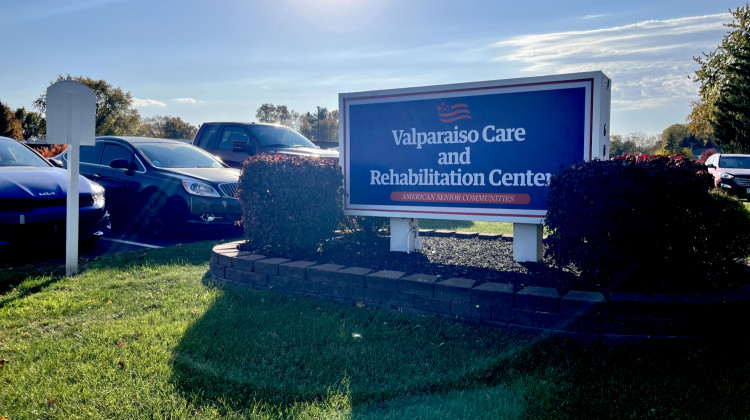
The case Health and Hospital Corporation of Marion County v. Talevski was brought by the Indiana agency, which owns 70 nursing homes across the state, in an attempt to block a nursing home resident from suing the government-owned nursing home.
Farah Yousry / Side Effects Public MediaBeneficiaries of safety net programs like Medicaid will continue to be able to sue states and state officials if their rights are violated, the U.S. Supreme Court ruled on June 8.
By a vote of 7-2, the justices upheld the long-standing right of beneficiaries of safety net programs and residents of government-owned nursing homes to seek recourse through the legal system if their rights are violated.
“It’s an absolutely huge deal,” said Sarah Somers, the legal director at the National Health Law Program. “It was a relief to see that seven justices out of the nine reaffirmed the rule that we've been living under for the last 30 years.”
The case –– Health and Hospital Corporation of Marion County v. Talevski –– was brought by the Indiana agency, which owns 70 nursing homes across the state, in an attempt to block a nursing home resident from suing the government-owned nursing home.
At the center of the case is the family of the late Georgi Talevski, a man who resided in the county-owned Valparaiso Care and Rehabilitation Facility. In court filings, the Talevski family said that Georgi’s rights, which are protected under the Federal Nursing Home Reform Act, were violated. The family claims that Georgi was overmedicated to keep him asleep, his dementia wasn’t properly managed, and he was involuntarily transferred to different facilities hours away from the family’s home, which accelerated his decline.
HHC of Marion County petitioned the Supreme Court to dismiss the Talevskis’ right to sue under the Civil Rights Act, and in the process took a wide pivot: asking the court to roll back this right for tens of millions of beneficiaries of a wide range of safety net programs across the country.
The U.S. Supreme Court sided with the Talevskis on both issues. In its ruling, released June 8, the court said that legal precedent supports the private right of action for beneficiaries of government programs as well as residents of government-owned nursing homes.
In November oral arguments before the Supreme Court, an attorney representing HHC and the Indiana solicitor general argued that because the civil rights law, known as Section 1983, was enacted by Congress in the 19th century, it could not have been intended to give third parties the right to sue to enforce a government contract. At that time, the attorneys said, common law for contracts did not confer that right.
In the court’s written decision, Justice Ketanji Brown Jackson said, “We reject both propositions. ‘Laws’ means ‘laws,’ no less today than in the 1870s, and nothing in petitioners’ appeal to Reconstruction-era contract law shows otherwise.”
Somers of the National Health Law Program said this ruling does not expand the rights of beneficiaries, but it reinforces already existing laws that have been critical to secure rights and hold states accountable if they misbehave.
“What was in jeopardy was the ability to make the promise of legal rights actually real and not just on paper,” Somers said.
Programs like Medicaid that rely on federal money flowing from Congress to states typically come with a set of provisions or requirements that states are supposed to follow in order to receive and use this money. Civil rights lawsuits are one of the primary enforcement mechanisms beneficiaries of federal entitlement programs have to hold state agencies accountable if they violate their rights or fail to provide entitled services.
There are other means of oversight, which supporters of the Indiana state agency’s petition tout as viable alternatives to lawsuits. But many legal experts and patient advocates say they’re rarely, if ever, helpful.
When Indiana tried to limit access to life-saving but expensive hepatitis C medications for patients on Medicaid, an Indiana mother of six sued the state and won. The court ruling provided a systemic remedy for everyone on Medicaid, not just the person filing the case.
When states tried to cap the benefits of people with disabilities, civil rights lawsuits have helped them gain access to things like in-home support with day-to-day tasks. It’s how people with disabilities won the right to be able to receive the services they need in their community as opposed to in an institutional setting.
“We're very excited about the decision today. I would say it's a huge win for disability rights and civil rights,” said Shira Wakschlag, senior director of legal advocacy and general counsel for advocacy organization The Arc. “This really has broad implications and a whole variety of areas for people with disabilities and the people that we serve.”
Those who supported HHC of Marion County’s petition said that a ruling in favor of the Talevskis will chip away at states’ financial resources as they litigate cases in court.
“All of Indiana’s governmental hospitals could face significant financial risk from a flood of federal lawsuits with limitless damages,” said Brian Tabor, the president of the Indiana Hospital Association, in an emailed statement last November on the cusp of oral arguments. “There is already a pathway for Hoosiers to freely pursue legal remedies in state courts.”
HHC of Marion County said that this lawsuit was meant to “focus its scarce public resources on the health care needs of historically underserved populations” and “understand from the Supreme Court the state of the governing law” when it comes to nursing home residents’ right to sue.
“With the Court’s definitive answer today that Medicaid-supported nursing home residents have both administrative and federal court remedies for alleged violations, HHC will continue to work to manage those operations safely and effectively and analyze the impact of the decision on those public resources,” HHC said in an emailed statement.
This story comes from Side Effects Public Media — a health reporting collaboration based at WFYI in Indianapolis. Contact Farah at fyousry@wfyi.org. Follow on Twitter: @Farah_Yousrym
9(MDAyMzk1MzA4MDE2MjY3OTY1MjM5ZDJjYQ000))
 DONATE
DONATE








 Support WFYI. We can't do it without you.
Support WFYI. We can't do it without you.